As I’m not into cultural or economic suicide – not that we aren’t doing pretty well with that all by our loneselves here – and, as I think Europe already has a leg up on us, I’ll let them slip off into the abyss by themselves.
But England, on the other hand – legendary land of stalwart, solid-as-oak hearts in fighting trim – perpetually baffles me with their slow motion, inexorable implosion. Particularly as they are mimicking every move of the failing examples set by their continental cousins.
When one can see Europe dying right from the cliffs of Dover, how do you then turn to your countrymen with the same ideas and present them as the very thing required to save your own?
The power generation problems are the exact same, although mounting public pressure is forcing the most ardent of renewables advocates to slow down their transition plans, or shelve them entirely for the moment – witness prime Minister Rishi Sunak’s sudden support for nuclear. Labour under Keir Starmer was still barreling along, insisting they were set on ending North Sea oil and gas exploration and drilling, which Sunak quickly countered by approving hundreds of new leases for the very same.
The man can read a room occasionally.
He’s had a rough time with farmers lately – battered by energy costs, as well as confused policies, subsidy changes, and labor shortages post-Brexit – and, by extension, the British public, who are tired of shortages in grocery stores, like tomatoes last fall and on-going problems with egg availability.
It doesn’t help that the Prime Minister’s representatives seem indifferent to the point of dismissiveness about the struggles in the agricultural sector.
…Farmers watched with incredulity at Environment Secretary Thérèse Coffey’s ham-fisted approach to a Q&A session with NFU [National Farmer’s Union] President Minette Batters on the final day of the annual event in Birmingham.
Chastising the NFU for starting 10 minutes later than planned — “It’s not my fault if we can’t be on time at the NFU conference,” Coffey said at one point — the Cabinet minister dismissed claims plummeting U.K. egg production had been caused by market failure and shrugged “we can’t control the weather in Spain” when talking about food shortages in British supermarkets.
She was roundly booed by those present.
“I’ve never felt a sentiment like that before,” said Exwood, who attended as NFU vice president.
The next day, Coffey incurred further criticism for suggesting in the House of Commons that Britons should eat more turnips — an unloved local crop — while more popular vegetables were in short supply. She was widely pilloried in the British press.
“Eat more turnips” must be the British government’s version of “learn to code.”
Now there’s a new threat to British agriculture and it has more than farmers raising the alarm. The last operational ammonia plant left in England is about to shutter its doors.
Why would that be significant?
Because it leaves England without a home grown source for the basic ingredient used in nitrogen fertilizers. The U.K. will now be dependent on imports for theirs.
Britain is shutting down its last remaining ammonia production plant. For the first time in a century this country will become entirely dependent on nitrogen fertiliser imported from abroad, says Ed Conway in the Times. https://t.co/1ashTmjihG
— Toby Young (@toadmeister) August 22, 2023
This is precisely the stick the European Union is using in Africa to keep them vassals of the state – denying them cheap, incredibly effective synthetic fertilizers in the name of climate change. And now England is doing this to themselves.
…The story of the past century, of a global population swelling to eight billion and beyond without running out of food, is the story of Haber-Bosch. Even if we gave over every acre of available land on this planet to agriculture, we could not grow enough food to keep us all alive without the nitrogen fertilisers made in Haber-Bosch plants. It’s hard to think of anything quite so important for our survival as a species.
Which is why the following piece of news should give us all pause for thought: Britain is shutting down its only remaining Haber-Bosch plant. This may come as a surprise — it hasn’t appeared in a single national newspaper report — but those who work in the business see it as a watershed moment. For the first time in a century this country will become entirely dependent on nitrogen fertiliser imported from abroad.
This has, in fairness, been a long time coming. The plant in question — a site in Billingham, Teesside, owned by the American firm CF Fertilisers — has been mothballed for a while. You need lots of hydrogen in those Haber-Bosch reactors, and the main way you get hydrogen is from natural gas; while gas prices have fallen since the invasion of Ukraine, they are nonetheless higher than they were a few years ago. Since nitrogen fertiliser is a natural gas product, CF has shifted production to America, where gas is more plentiful and cheap.
The Haber-Bosch process is named for the two fellows who discovered the high heat-high pressure chemical process that converts nitrogen from the air and hydrogen from natural gas (or other hydrocarbon source) into ammonia.
"In summary, the Haber-Bosch process is one of the most important industrial processes in the world and requires fossil fuels. Nearly half the world’s population relies on the synthetic fertilizers produced in this process. Before the Western world suggests an end to fossil fuel… pic.twitter.com/U8FWHPWr0k
— Dr. Matthew M. Wielicki (@MatthewWielicki) August 19, 2023
What fertilizers have done for the world is simply miraculous.
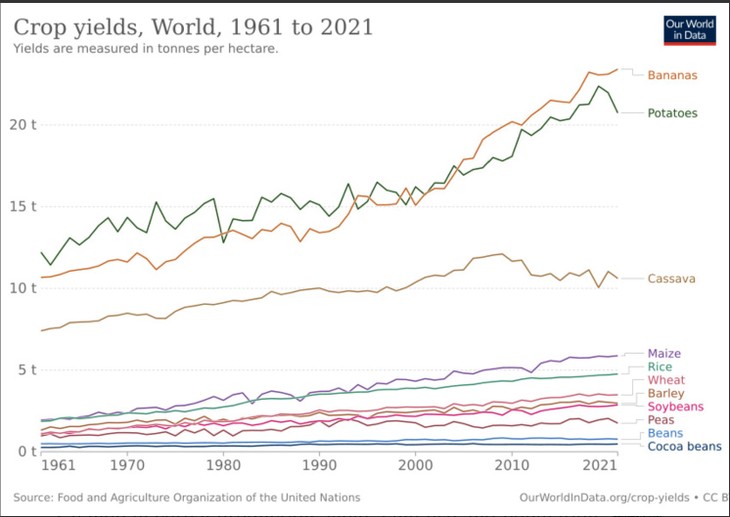
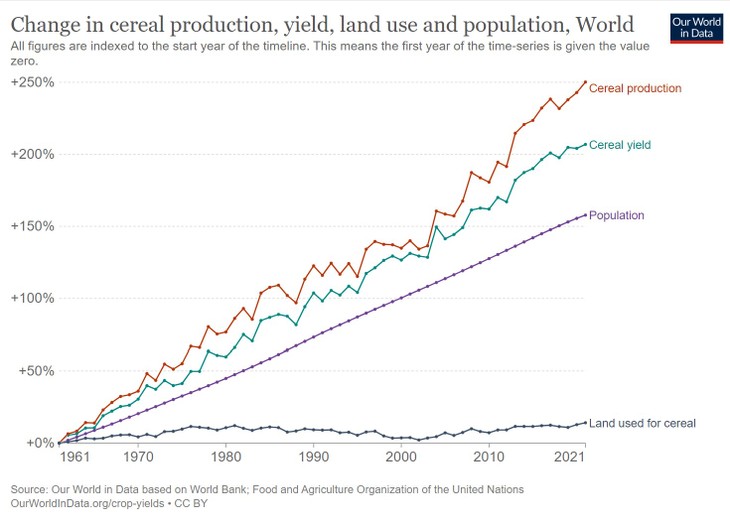
What happens when you can’t get nitrogen fertilizers and are forced into “organic” or whatever the hell “sustainable solutions” means, as Green advocates – who are never actually farmers – very much want to force agriculture at large to do?
World’s finest example of that right here.
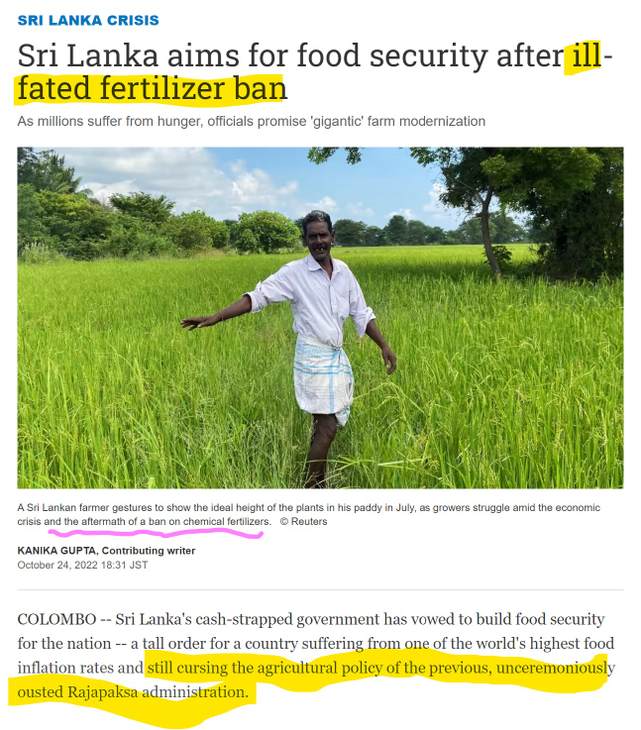
Abject failure, starvation, and poverty within two short years of the implementation. And Sri Lanka isn’t crawling back any time soon.
The Ukrainian War has already driven fertilizer prices through the roof thanks to the sanctions on Russia, which is the world’s top producer.
The price of fertilizer, which is among farmers’ greatest expenses, reached all-time highs in the spring of 2022 after Russia, the world’s top fertilizer exporter, invaded Ukraine in February. The Russia-Ukraine war exacerbated an already tight global supply situation that had begun in 2020 with COVID-19-related worker shortages and factory shutdowns, the first of several disruptions that sparked volatility in the fertilizer market.
Why would the British government, with an agricultural section already under siege, take the chance on imperiling it further in a geopolitically unstable world by making it dependent on imported materials for the very nutriment that feeds it? What are the carbon costs of shipping it from the U.S. to the U.K., vice manufacturing their own?
This development would fit very nicely into the University Of Cambridge’s “Absolute Zero” plan. They don’t intend for Brits to have any beef or lamb eventually anyway, along with almost no fertilizer usage in their 2030-2049 time frame.
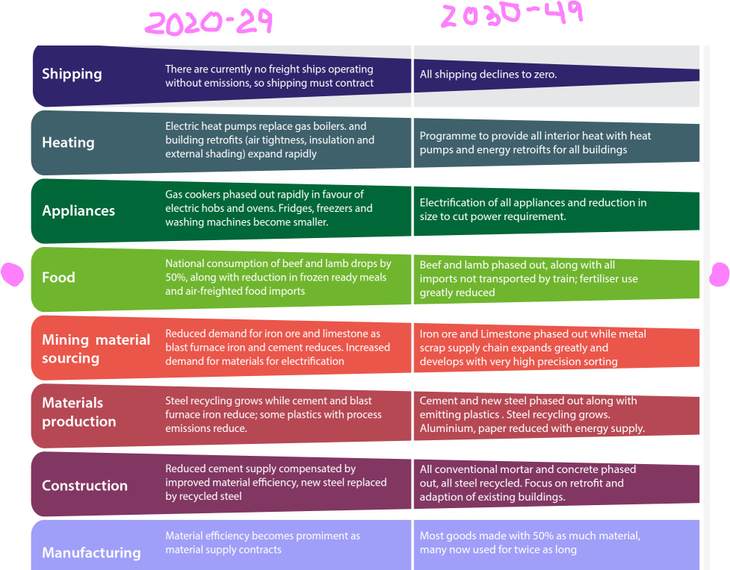
LET THEM EAT TURNIPS is a whale of a campaign slogan if they make the wrong decision.
What a great world they have planned out for us.
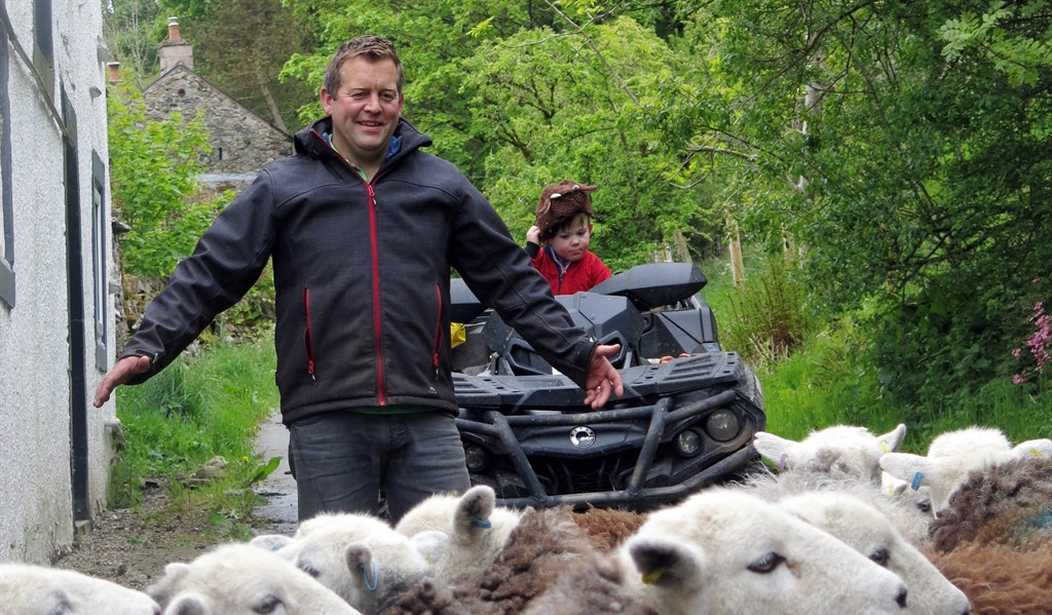







Join the conversation as a VIP Member